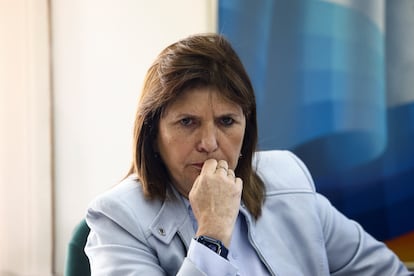Argentina’s case against an unlikely terrorist cell falls apart
A judge releases a table tennis teacher, a barber and an alleged Spanish mercenary due to insufficient evidence


Three men detained on January 3 by Argentine police, suspected of being part of a terrorist cell planning an attack in Buenos Aires, have been released due to insufficient evidence. A barber from Buenos Aires, a table tennis teacher of Syrian origin, and an alleged Spanish mercenary were accused of being unofficial agents of the United States. They spent almost two weeks in prison as the Argentine government told its story of the alleged plot. However, the judge investigating the case ruled that the government’s case lacked merit after the Security Ministry’s allegations crumbled under scrutiny.
Security Minister Patricia Bullrich announced on January 3 that three men were captured after a surveillance operation at Buenos Aires airports over the New Year holiday weekend. The men allegedly awaited a package from Yemen and intended to enter the Argentine capital on different flights. This information turned out to be false. The government was also suspicious about one man’s hotel accommodations near the Israeli embassy in Buenos Aires. The whole affair seems to have been sparked by President Javier Milei’s support for Israel in its war with Hamas, as well as Bullrich’s heavy-handed security posture.
According to an investigation by the elDiarioAR news website, the plot was fabricated by Juan Manuel Ledesma, an Argentine-Spanish man in his 50s who nicknamed himself “El Rubio.” Ledesma, who initially claimed to be a U.S. agent but later denied it in court, also claimed to be a former police officer, independent journalist, intelligence and security contractor, and former French Legionnaire. As evidence of his exploits, he offered a 2016 interview with elespanol.com about his role in rescuing 55 girls who had been kidnapped by Boko Haram guerrillas in Nigeria two years prior.
In his statement to investigators, Ledesma said a concierge at a Buenos Aires hotel told him about a suspicious guest of Syrian origin with a Venezuelan passport. He then connected this with another story he had heard in late December. Ledesma’s barber had suddenly disappeared from the hair salon where he worked. When Ledesma asked about him at the salon, he learned that the barber had been fired out of concern that he would bring trouble. The barber had told his boss that he had almost fallen for a social media scam involving an American woman who wanted him to transfer hundreds of dollars in exchange for a gift she would send him from Yemen. The man reported the scam, but just to be safe, he told his boss to reject any suspicious package addressed to him. Ledesma connected the incidents and reported both men.
“I just put two and two together,” Ledesma told the judge. While all this was going on, the Pan American Maccabi Games were kicking off in Buenos Aires. Jewish athletes from Israel and North, Central and South America had come to compete in sports events while Middle East tensions escalated rapidly. Ledesma said he thought Argentina could become a target of an anti-Semitic attack as it had in the 1990s. He alerted a police officer who then informed the Israeli embassy about a suspected terrorist cell consisting of three people of Syrian-Lebanese origin. Supposedly, the cell was being investigated in Colombia and planned to travel to Argentina with malicious intent. Since Ledesma couldn’t adequately explain the source of his information, he was quickly arrested.
Ramón Alberto Domínguez, the barber, had been chatting online for months with a woman who, after offering him gifts and saying she wanted to move to Argentina, started pressuring him to pay her $900 for a package she was supposed to send. Domínguez reported this in October, and the Argentine Federal Police concluded that it was a common scam, as reported by Página/12. During the judge’s investigation, Domínguez and 67-year-old Naem Chatay Chassan were arrested and held for two weeks. Chassan, a table tennis teacher in Bogotá, had come to Argentina to establish a table tennis gym. The Security Ministry’s suspicions were aroused when it learned about Chassan’s dual nationality, and that he was staying in a modest hotel in downtown Buenos Aires just two blocks from the Israeli embassy.
The judge overseeing the case, María Eugenia Capuchetti, released the men on January 15 based on insufficient evidence that they were involved in a transnational criminal enterprise. However, she ordered them to remain in the country while she concludes her investigation. The Argentine government has not commented on the matter.
Sign up for our weekly newsletter to get more English-language news coverage from EL PAÍS USA Edition
Tu suscripción se está usando en otro dispositivo
¿Quieres añadir otro usuario a tu suscripción?
Si continúas leyendo en este dispositivo, no se podrá leer en el otro.
FlechaTu suscripción se está usando en otro dispositivo y solo puedes acceder a EL PAÍS desde un dispositivo a la vez.
Si quieres compartir tu cuenta, cambia tu suscripción a la modalidad Premium, así podrás añadir otro usuario. Cada uno accederá con su propia cuenta de email, lo que os permitirá personalizar vuestra experiencia en EL PAÍS.
¿Tienes una suscripción de empresa? Accede aquí para contratar más cuentas.
En el caso de no saber quién está usando tu cuenta, te recomendamos cambiar tu contraseña aquí.
Si decides continuar compartiendo tu cuenta, este mensaje se mostrará en tu dispositivo y en el de la otra persona que está usando tu cuenta de forma indefinida, afectando a tu experiencia de lectura. Puedes consultar aquí los términos y condiciones de la suscripción digital.








































